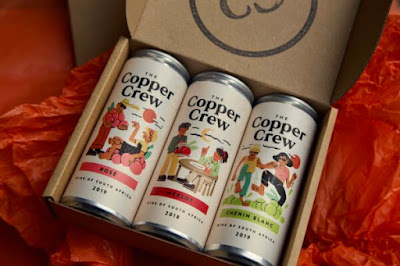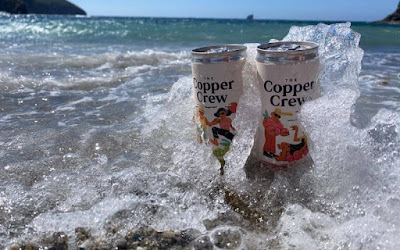The Co-Founder of a wine start-up gives his insights into launching a wine business
If you ever want to start your own business in wine, then the two things you should do before anything else are read a book about it and speak to someone who has been through it.
Richard Horwell's book 'How to develop and launch a drink brand’ was published on 21st March.
Here, Copper Crew co-founder Oli Purnell talks about his experience of starting up a canned wine business and considers the advice Richard gives in his book.
Will there be a boom in canned wine?
The reality is is yes, there is good growth in this sector but it is coming from a low base.
The most explosive growth within drinks is found in RTDs (ready-to-drink formats) in the UK. Hard Seltzers are over-hyped and there has been significant stock shedding from big producers however the growth still remains rapid.
A lot of thinking in this space from conversations I've had with producers is you've got to just get out there and gain market share then worry about making money.
Convenience is a significant factor in the growth behind canned wine, but we've found the number one driver to be portion control. Therefore, canned wine has a perhaps unexpected resonance with older age demographics (50-80). Many of these consumers are actually more opened minded than people (younger age demographics) just getting into wine.
Is it difficult to launch a wine business? What do you need to know?
There are many, many issues as a start-up in this space. Here are the big ones from our experience:
- Cashflow in alcohol is a tricky balance and is often the critical thing in keeping the lights on. I think any book on setting up a drinks business must go through the fundamentals of accounting for duty and invoice financing
- Finding suppliers is also really difficult. Simply put, a lot of people don't want to put their wine in cans. Many talk a big sustainability game but when you try and suggest using cans will help them meet sustainability goals they simply aren't interested.
This also applies on the production side; when we looked around the UK in 2019 to set up canning here we were shocked by the cowboy nature of the industry. The quality of contract canning operations generally remains really poor. This is a problem because a canner might go from filling kombucha to filling wine in their next run. There will almost certainly be fermentation pick up on this and that will destroy literally pallets of wine
On a related note, the technicalities of canning wine are very difficult and require an expert. We have a winemaker as part of our business to address this so we have the technical expertise in house - without it you will face significant quality issues on the line
What about sparkling wines in cans?
This is not something we have done, and personally I think it's a big growth opportunity. However the quality issues are amplified further when dealing with sparkling. Getting this right is very difficult
What about competition from bigger players?
This is absolutely an issue. A key advantage bigger players have is not simply marketing spend but also wine costs. Big competitors will be able to get wine at a price which is simply impossible for a start-up to achieve. Many consumers are tight when it comes to spending on wine and because of the impact of duty on overall bottle price, this difference in the ability to buy cheaper wine at the start makes a big difference
What about admin and regulation?
The AWRS (Alcohol Wholesaler Registration Scheme) is a big faff and means you can't hit the ground running. A more general point on alcohol being so tightly regulated is that you can't use guerrilla marketing tactics which are such a clear and proven path in FMCG
And money?
You need a lot of money to keep the lights on, especially because of the duty point made above. Another relevant thing here is the price of literally everything across the supply chain is going up so making the unit economics work is tricky at the moment
Exporting?
This has been made incredibly difficult as a result of Brexit and is seriously time consuming. Being able to export relatively quickly (1-2yrs) was an important aspect of our business plan because of the strong growth of canned wine amongst the Nordics. To get this overline would pretty much require one of us (there are 2 of us who run the business in the UK) to work full time on the export. Losing relatively easy market access to export is a big barrier
It's a chicken-and-egg problem - one of the most common things we face is:
- retailers: "we think canned wine is a great segment and consumers are warming to it"
- us: "great, would you like to move forward with an order"
- retailer: "no not yet we want to see how the market plays out".
We believe that without good wine coming out in cans and good availability, the market won't happen (ie consumers won't be interested). Retailers waiting around for the market to 'happen' risks it not happening.
Low-quality offerings flooding the market; if canned wine becomes associated with low-quality wine which is basically functional rather than pleasant, it risks the category being tainted
What about flavoured wines?
I agree there's good potential here but consumers are incredibly brand sensitive in alcohol and I think this is especially the case in something like flavoured wines.
Success in this category I would have thought will come from an existing well known brand doing something innovative.
The Copper Crew Wines
I have been very impressed with the wines from Copper Crew which have won plaudits from across the the press:
The White and Rosé: The Cambridge Wine Blogger: The Copper Crew - Canned Wine
The Special Edition Sauvignon: The Cambridge Wine Blogger: Copper Crew Limited Edition Sauvignon Blanc 2020



No comments:
Post a Comment